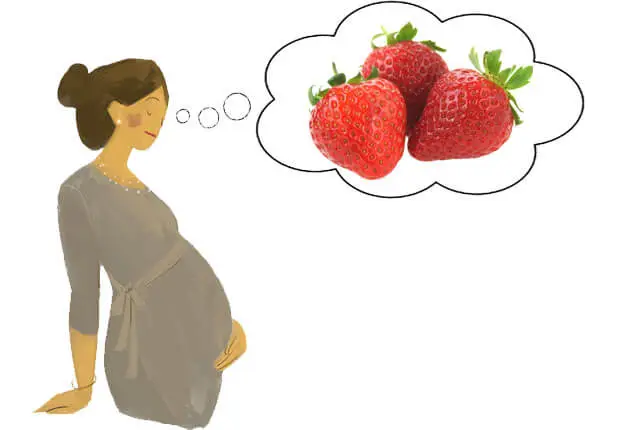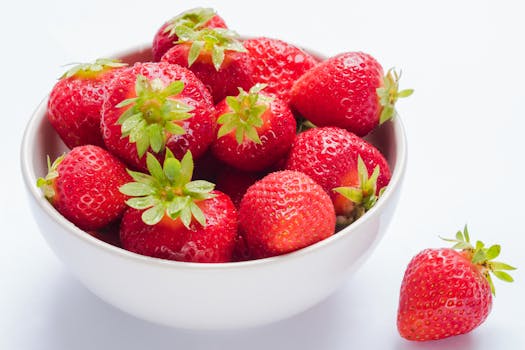💡 Updated on July 16, 2025 — We refreshed this post with new pregnancy-safe tips, updated guidance, and helpful answers to keep you (and baby!) feeling good about strawberries.
Ever wondered, “Can I eat strawberries during pregnancy?” You’re not alone, mama—and the good news is, you probably don’t have to wonder anymore.

Strawberries are one of those crave-worthy, feel-good fruits that most of us love, but during pregnancy, it’s totally normal to second-guess even the healthiest snacks. That’s why I’m breaking it all down for you in this post: from the nutritional perks and safety tips, to which forms of strawberries (like smoothies, juice, or even jam!) are pregnancy-safe.
Here’s everything you need to know about eating strawberries when you’re expecting—so you can enjoy those juicy bites with confidence. 💕
Are Strawberries Safe During Pregnancy?
Yes, strawberries are generally safe to eat while pregnant. Strawberries are sweet, refreshing, and full of nutrients. They’re low in calories and high in antioxidants, vitamin C, fiber, and folate, all of which support both your body and your growing baby.
However, there are a few safety precautions to consider when eating strawberries during pregnancy. So, let’s discuss how many strawberries you can safely eat each day while pregnant and what you should keep in mind while enjoying them.
How Many Strawberries Are Safe to Eat While Pregnant?
There’s no strict limit, but moderation is key, especially when balancing fruit intake during pregnancy. A healthy serving for most expecting mamas is about 1 cup (150 grams) of strawberries per day, which equals roughly 8 medium-sized berries.
This portion gives you a solid boost of vitamin C, fiber, and folate without going overboard on natural sugars. And don’t forget, strawberries count toward your daily fruit intake. The American Pregnancy Association recommends about 1 to 1½ cups of fruit per day during pregnancy.

Of course, every pregnancy is different. If you’re managing gestational diabetes or watching your sugar intake, it’s a good idea to talk with your doctor about what portion is right for you.
Safety Tips for Eating Strawberries During Pregnancy
- Wash thoroughly under running water and gently rub to remove dirt, bacteria, and pesticide residue.
- Choose organic when possible! Strawberries often top the “Dirty Dozen” for pesticide exposure, which may affect fetal development.
- Skip the mushy or moldy ones as they can harbor dangerous bacteria.
- Monitor reactions, especially if you’ve had allergies or salicylate sensitivity (can cause headaches or digestive upset).
- Enjoy smoothies and yogurts safely: only use pasteurized dairy or juices to avoid foodborne illness.
Health Benefits of Strawberries During Pregnancy
Strawberries are highly nutritious, making them especially beneficial during pregnancy.
Some key nutrients in strawberries:
- Vitamin C: Supports your immune system and helps your body absorb iron.
- Folate: Strawberries are a great natural source of folate, which is essential for fetal neural tube development, especially in the first trimester.
- Antioxidants: Support overall health and may help reduce inflammation.
- Fiber: Helps ease pregnancy-related constipation.
- Potassium: Supports healthy blood pressure and reduces the risk of preeclampsia.
- Manganese: Aid in bone health.
🍓 Why Mamas Crave Strawberries
Pregnancy cravings often signal your body’s nutritional needs, and strawberries are a natural craving-friend! Expecting mamas often find themselves craving these juicy berries because they’re low-calorie, sweet, and packed with vitamins (like Vitamin C and folate) that support pregnancy nutrition.
Are There Any Risks?
For most pregnant women, strawberries are safe and even recommended. But there are a few things to be aware of:
- Allergies: If you’re allergic to strawberries, it goes without saying → avoid them. Allergies are rare, but eating strawberries can cause rashes, swelling, or breathing issues. Seek medical help if these appear.
- Pesticides: Non-organic strawberries are often treated with pesticides, so it is crucial to wash them thoroughly.
- Gestational diabetes: Strawberries have natural sugars, so if you’re managing gestational diabetes, talk to your provider about appropriate portions.
- Salicylates: Strawberries contain natural salicylates, similar to those in aspirin. While beneficial for plants, salicylates can cause adverse reactions in sensitive mamas. Overall, strawberries are a low to moderate source of these compounds.
- Acid reflux: If strawberries ignite heartburn, pair them with non-acidic foods like yogurt or oatmeal.
Ways to Enjoy Strawberries During Pregnancy

If you’re not just snacking on fresh strawberries but also love them in drinks, desserts, or jams, here’s what you need to know about safety and best practices during pregnancy.
Strawberry Smoothies or Milkshakes
Strawberry smoothies and milkshakes are tasty and safe options for enjoying strawberries during pregnancy, as long as you use pasteurized ingredients.
So, to stay safe:
- Use pasteurized milk, yogurt, or kefir
- Choose 100% fruit juice (pasteurized only)
- Add frozen strawberries or bananas that have been washed and handled properly
- Use small amounts of natural sweeteners like honey or maple syrup and skip sugary syrups or artificial flavors
- Avoid adding raw eggs or unpasteurized dairy
💡 Note: Smoothies can be nutrient-dense, but keep an eye on sugar content, especially in store-bought versions.
Strawberry Tea
Strawberry tea (made from dried strawberries or strawberry leaves) is generally safe during pregnancy if it doesn’t contain other herbs that are contraindicated.
Thus, look for simple blends with only dried strawberries or leaves, or even better, herbal teas labeled as safe for pregnancy. And avoid teas containing herbs like hibiscus, licorice root, or other unregulated ingredients.
💡 Note: When unsure, check with your doctor or midwife, especially if drinking regularly.
Strawberry Juice
Yes, you totally can. However, ensure it’s pasteurized to keep things safe for you and your baby. Unpasteurized juice can carry some yucky stuff like Listeria or E. coli, and we’re not taking chances with that.
A few things to keep in mind:
- Grab store-bought juices labeled “pasteurized”
- Skip freshly pressed or unverified juices from stands or juice bars (tempting, I know!)
- Keep an eye on sugar—some juices sneak in a lot
📌 Making your own at home from fresh, well-washed strawberries? Even better—you know exactly what’s going in your glass!
Strawberry Jam
Strawberry jam is generally safe during pregnancy. But think of it more as a little treat than a pantry staple.
Go for store-bought versions that are pasteurized, and if possible, choose one that’s low in sugar or made with just fruit. Homemade jam can be fine too, but only if you know it was made with safe, clean methods.
Frequently Asked Questions about Strawberries in Pregnancy
🍓 Bottom Line for Moms-to-Be
Still wondering if you can eat strawberries during pregnancy?” Hopefully not anymore, because the answer is a big, juicy yes.
Just enjoy them with a bit of common-sense care. Meaning rinse them well, skip any that look sad or mushy, and eat them in moderation as part of your balanced pregnancy diet.
Strawberries are more than just a craving. They’re packed with vitamin C, folate, and antioxidants that are actually good for both you and your baby.
So yes, toss them on your oatmeal, blend them into a smoothie, or snack on them straight from the bowl. Strawberries are one treat you don’t have to overthink. 🍓💕
No affiliate links here—just mama-tested advice and honest insight. If I ever link to products, I’ll keep you in the loop.
